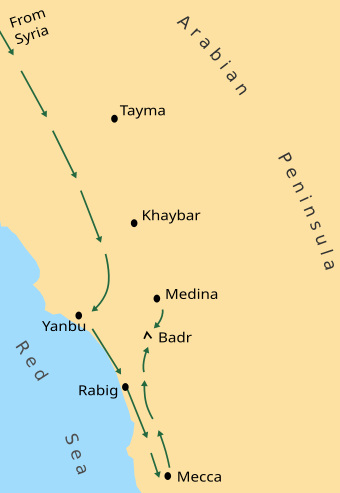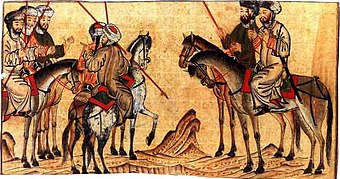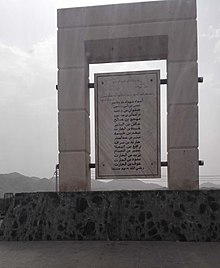Battle of Badr
A few days before the battle, when he learnt of a Makkan caravan returning from the Levant led by Abu Sufyan ibn Harb, Muhammad gathered a small expeditionary force to capture it.
Abu Sufyan, learning of the Muslim plan to ambush his caravan, changed course and took a longer route away from Muhammad's base at Medina and sent a messenger to Mecca, asking for help.
Amr Bin Hisham commanded an army nearly one-thousand strong, approaching Badr and encamping at the sand dune al-'Udwatul Quswa.
The Muslims countered their charge and broke the Meccan lines, killing several important Quraishi leaders including Abu Jahl and Umayyah ibn Khalaf.
[3] The battle has been passed down in Islamic history as a decisive victory attributable to divine intervention, and by other sources to the strategic prowess of Muhammad.
[4] In early 624, a caravan of the Quraysh led by Abu Sufyan ibn Harb carrying wealth and goods from the Levant (possibly Gaza[5]) was returning to Mecca.
[6] But Watt writes given that it took the Meccan army a week to get to Badr, Abu Sufyan must have sent his request before the Muslim preparations began.
Damdam, upon his arrival at the Ka'bah, cut off the nose and ears of his camel, turned its saddle upside down, tore off his shirt and cried:[8] "O Quraish!
"[8]Abu Sufyan had rerouted his caravan toward the Red Sea and escaped the Muslim threat by Damdam's arrival at Mecca.
The future Caliph Uthman stayed behind to care of his sick wife Ruqayyah, the daughter of Muhammad, who later died from illness.
[11] All of the clans of the Quraish except the Banu 'Adi quickly assembled an excited army of around 1300 men, 100 horses and a large number of camels.
Abu Jahl was not interested in returning and insisted on proceeding to Badr, and holding a feast there to show the Muslims and the surrounding tribes that they were superior.
Despite Abu Jahl's threat and insistence, the Banu Zahrah, numbering around 300, broke away from the army and returned to Mecca, on the advice of Al-Akhnas ibn Shurayq.
'Umayr ibn Wahb al-Jumahi made a survey of the Muslim position and reported 300 men keen on fighting to the last man.
[8][17] This further demoralized the Quraish, as Arab battles were traditionally low-casualty affairs, and set off another round of bickering among the Quraishi leadership.
However, according to Arab traditions Amr ibn Hishām quashed the remaining dissent by appealing to the Quraishis' sense of honor and demanding that they fulfill their blood vengeance.
[19] The battle began with al-Aswad bin 'Abdul-Asad al-Makhzumi, one of the men from Abu Jahl's clan, the Banu Makhzum, swearing that he would drink from the well of the Muslims or otherwise destroy it or die for it.
Three of the Madani Ansar emerged from the Muslim ranks, only to be shouted back by the Meccans, who were nervous about starting any unnecessary feuds and only wanted to fight the Muhajirun, keeping the dispute within the tribe.
"Muhammad gave the order to carry out a counterattack against the enemy now, throwing a handful of pebbles at the Makkans in what was probably a traditional Arabian gesture while yelling "Defaced be those faces!
Muslims attribute their fear of fighting and fleeing from the battlefield to divine intervention, with the Qur'an stating in Chapter 8, verse 12, that Allah inspired angels to strengthen those who have believed, and cast terror into the hearts of those who disbelieved.
[23] The Qur'an describes the force of the Muslim attack in many verses, which refer to thousands of angels descending from Heaven at Badr to terrify the Quraish.
[24][25] It also describes how Iblis, the Leader of the Jinn, mentioned to have taken the form of Suraqa ibn Malik, fled the battlefield upon seeing the angels.
[8] Muslim sources take this account literally, and there are several ahadith where Muhammad discusses the Angel Jibreel and the role he played in the battle.
[30][31] William Muir wrote of this period: In pursuance of Mahomet's commands, the citizens of Medîna, and such of the Refugees as possessed houses, received the prisoners, and treated them with much consideration.
Marshall Hodgson adds that Badr forced the other Arabs to "regard the Muslims as challengers and potential inheritors to the prestige and the political role of the [Quraish]."
Shortly thereafter he expelled the Banu Qaynuqa, one of the Jewish tribes in Medina for assaulting a Muslim woman which led to their expulsion for breaking the peace treaty.
The death of Amr ibn Hisham, as well as many other Quraishi nobles,[36] gave Abu Sufyan the opportunity, almost by default, to become chief of the Quraish.
[37] In later days, the battle of Badr became so significant that Ibn Ishaq included a complete name-by-name roster of the Muslim army in his biography of Muhammad.
The story of the Battle of Badr has been passed down in Islamic history throughout the centuries, before being combined in the multiple biographies of Muhammad that exist today.
[43] During the 2011 Libyan civil war, the rebel leadership stated that they selected the date of the assault on Tripoli to be the 20th of Ramadan, marking the anniversary of the Battle of Badr.





